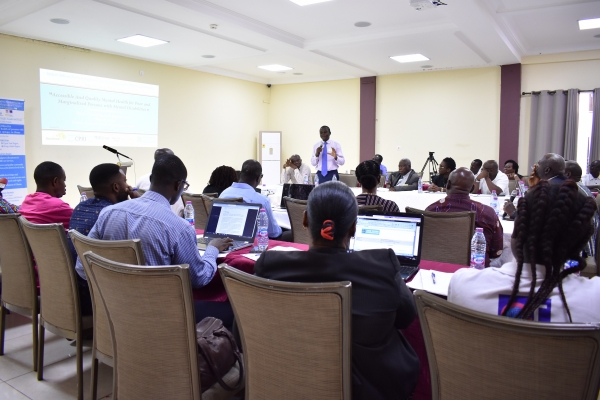BasicNeeds-Ghana, on August 29, 2019, organised an inter-ministerial forum which brought together heads of key ministries and government agencies to discuss sustainable ways of financing community mental health in Ghana. This forum was a follow-up to an earlier one that was held in April 2018. The forum formed part of activities of a STAR-Ghana Foundation funded project titled “Accessible and Quality Mental Health Care for Poor and Marginalised Persons with Mental Disorders.”
Ministries and agencies represented at the meeting were Ministry of Health (MoH), Ministry of Local Government and Rural Development (MoLGRD), Ministry of Gender, Children and Social Protection (MGSCP), the Ghana Health Service (GHS), National Health Insurance Authority (NHIA) and Mental Health Authority of Ghana (MHAG). Other organisations in attendance were the Consortium of NGOs implementing the project – BasicNeeds-Ghana, Mental Health Society of Ghana (MEHSOG), MIHOSO International Foundation and Centre for People’s Empowerment and Rights Initiatives (CPRI). Other participants included directors of psychiatric hospitals, academia and other mental health experts.
Executive Director of BasicNeeds-Ghana, Peter Badimak Yaro, in his welcome message, expressed his appreciation to STAR Ghana Foundation for supporting BasicNeeds-Ghana and other implementing partners to undertake a project towards improving inclusion of poor and vulnerable people with mental illness in Ghana. He said that the main purpose of the day’s deliberations was to identify ways of advocating for government to increase allocations to support mental health services in the country. Peter Badimak Yaro said he was concerned about regular instances where government only intervened after Psychiatric Hospitals had gone to the media to air their grievances. A far more dire situation, in his view, was the failure by government to adequately resource district-based facilities to run mental health services given that such services had been integrated into the general health system.
The acting Programmes Director of STAR Ghana Foundation, Alhaji Ibrahim Tanko asked the participants to think on how mental health in Ghana could be financed without resorting to any donor. He identified inadequate and untimely release of funds for mental health delivery as the main issues affecting sustainable resourcing of mental health care in Ghana. Alhaji Tanko acknowledged that the current state of mental health financing in Ghana was proof of the country’s failure to prioritise the mental health issues. He, therefore, expressed optimism that the forum would be the turning point where stakeholders went beyond the usual rhetoric and pursued concrete steps to prioritise mental health.
A Deputy Director at the NHIA, Mrs Ruby Mensah Annan, in her presentation on the topic “Mental Health Financing within the Context of Free Mental Health Care” identified government’s “free mental health” policy as the main reason why mental health could not be covered under the NHIS. She added that even though NHIA strictly follows the list of conditions and treatment spelt out in its guidelines, the Ministry of Health had the responsibility of advising the NHIA on pricing of accredited list of medicines. She, therefore, encouraged participants to propose solutions to NHIA and the Ministry of Health to help them solve the problem of double resourcing of parallel institutions and double billing which would certainly occur if NHIS assumed coverage of mental health services under the current policy regime.
Chief Executive Officer of the Mental Health Authority, Dr Akwesi Osei during his presentation on the topic “Mental Health Funding Situation in Ghana” said that in spite of available evidence suggesting that mental illness is associated with high levels of health service utilization and associated cost, funding for mental health care in Ghana was still poor. He said that the little resource government disbursed for mental healthcare in the country was allocated to the three (3) psychiatric hospitals. He, therefore, emphasised the need to increase allocation to the mental health fund and use it equitably through out the country.
During the plenary, several key actors made contributions to the conversation. Alhaji Sulemana Bening, Director of Planning at the Ministry of Health, said there was the need to revisit aspects of levy for the Mental Health fund within the legislative instrument of the Mental Health Law (Act 846). He called on the NHIA, MHA and MOH to synchronize efforts at finding innovative and sustainable ways to finance mental health services. Dr Samuel Kaba of the Ghana Health Service made similar calls when he said there was poor coordination between GHS, MHA and other mental health allies. He stressed on the need for these agencies to integrate their work and present a united front where service delivery is seen as a priority.
Prof JB Asare, former Chief Psychiatrist, opined that the Mental Health Fund was established by law; the “Free Mental Health” policy was meant to help patients to visit health facilities for treatment. He suggested that NHIS had removed mental health care from their list of medicines covered under the scheme. He, therefore, called for a review of that decision. The former Chief Psychiatrist further advised MHA to be visible, define its own structure, hire potent fundraisers and work together with GHS and other stakeholders to address mental health funding issues.
Specialist Psychiatrist and acting Director of Pantang Psychiatric Hospital, Dr Frank Banning suggested that the NHIA had not been fair to mental health. The acting director bemoaned the situation where NHIS agreed to reimburse sub-district facilitie for mental health services offered by did not do same for for main hospitals. He also noted with concern the difference in the cost of psychotropic medicine found on the NHIS list of approved medicine those found on the open market. He recommended for a review of these situations to ensure fairness and equity.


